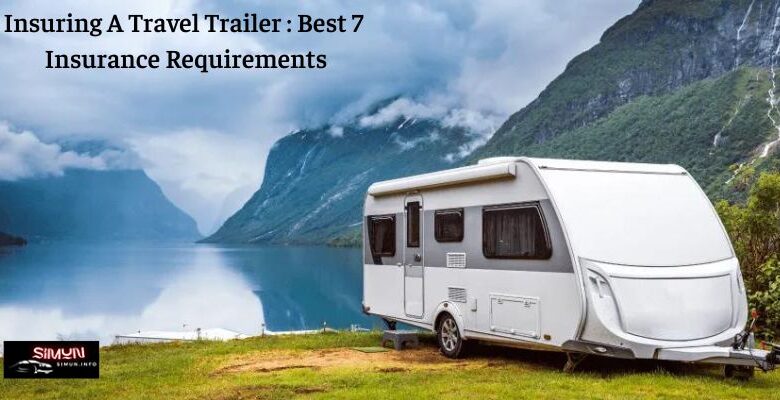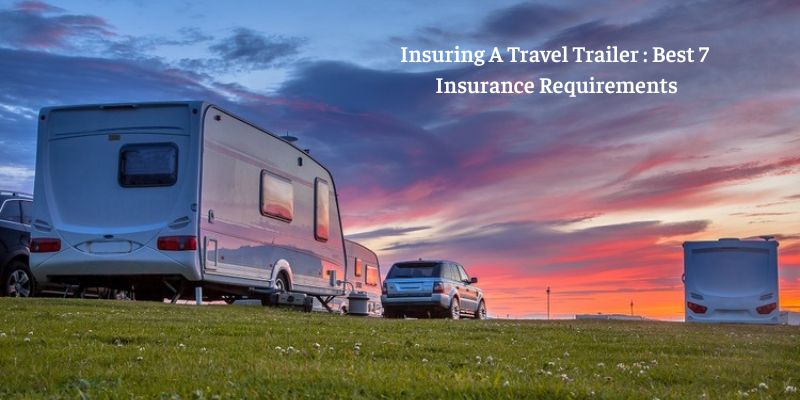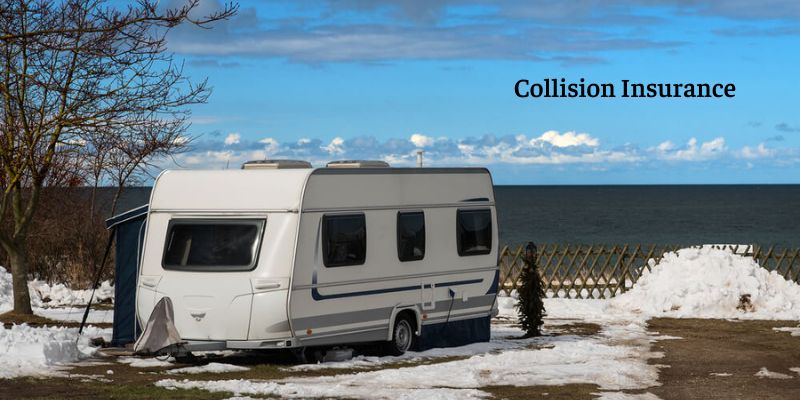Insuring A Travel Trailer : Best 7 Insurance Requirements

Compared to motorhomes, insuring a travel trailer are frequently more portable and simpler to use as a vacation home. Additionally, by reserving a spot at one of the many free campsites spread out across the nation, you may travel to the locations you truly appreciate while getting much better gas economy. See more on simun.info
Insuring A Travel Trailer: Do Travel Trailers Need Insurance?

You are not required by law to keep any type of RV insurance on travel trailers because they are not driven. In contrast, you must have liability insurance on the car pulling it (in all states excluding New Hampshire and Virginia), and as long as the travel trailer is connected, this insurance will also apply to your trailer.
Therefore, the liability coverage on your travel trailer’s auto insurance policy will aid in paying for damage to the other vehicle and medical costs if anyone in the other vehicle sustains injuries if you unintentionally back into someone else’s vehicle or RV.
However, if your travel trailer is detached from the vehicle pulling it, that coverage does not continue. Therefore, you might have to foot the bill for the damages if your travel trailer comes unhitch and slides down a hill into another car.
In either case, the only coverage you have is for injuries or property damage your travel trailer causes, as well as medical expenses if anyone is hurt. Any damage that your travel trailer receives won’t be covered by insurance. You would need to spend money on RV insurance for that.
Insuring A Travel Trailer: What Does Insurance for Travel Trailers Cover?
The same things that a vehicle insurance policy can cover are also covered by RV insurance, sometimes known as travel trailer insurance. It may include coverage for bodily injury liability, property damage liability, collision, comprehensive, and replacement of personal effects. Having all of them would be seen as having comprehensive coverage and would protect you against damage to your travel trailer, damage brought on by your travel trailer, and injuries related to accidents that you may or may not have been at fault for.
Even though just a subset of those coverages are legally necessary, people go over them all anyhow because we always advise that you insure your cars completely.
Insuring A Travel Trailer : Best 7 Insurance Requirements

As we have established, travel trailer owners are not legally compelled to carry RV insurance. Some instances of damage your travel trailer causes will be covered by the liability component of the towing vehicle’s auto insurance policy. Look at it now.
1. Insuring A Travel Trailer: Physical Injury Liability Insurance
In most jurisdictions, bodily injury liability insurance is necessary, and it can be transferred from the auto insurance of the car pulling your travel trailer. Additionally, it may be purchased as a stand-alone policy or in conjunction with complete coverage on your RV insurance for your travel trailer.
If you cause an accident with your travel trailer, it can pay for the affected parties’ medical expenses and legal fees should they choose to file a claim against you. However, it only covers accidents involving others outside of your car.
2. Insuring A Travel Trailer: Insurance Against Property Damage
Another insurance option is property damage liability, which can be added to full coverage on your travel trailer’s RV insurance or transferred over from the vehicle hauling it.
It’s intended to cover damage you do to another person’s car, recreational vehicle, or property if you are involved in an accident and are found to be at fault. However, your vacation trailer or vehicle are never covered.
3. Insuring A Travel Trailer: Coverage for Travel Trailer Insurance That May Not Be Required
The best travel trailer insurance isn’t needed by law, but your lender or your own self-evaluation might. We strongly advise getting comprehensive coverage RV insurance that covers your travel trailer against a range of potential risks, including the liability coverage for bodily injury and property damage liability that was stated earlier. Let’s examine what you can anticipate.
4. Insuring A Travel Trailer: Collision Insurance

Your travel trailer’s damage may be covered by collision coverage under your RV insurance policy. Whether you are at blame for the collision or not, your insurance should take effect. Therefore, even if the accident wasn’t your fault, your policy may still start paying for some or all of the damage.
If you accidently scrape your travel trailer’s roof against a low-hanging bridge or if you fail to roll the awning back in before leaving, this coverage may help cover the costs.
5. Insuring A Travel Trailer: Complete Protection
Comprehensive insurance covers your travel trailer against loss brought on by events beyond your control, including theft, vandalism, and natural disasters like floods, hurricanes, and tornadoes.
6. Insuring A Travel Trailer: Insurance for Replacement of Personal Effects
Only the personal effects replacement coverage is included in an RV insurance policy but not an auto insurance policy. Since you probably keep personal items in your travel trailer while you’re out on the road, this coverage may be able to assist you get compensated for losses they suffer.
7. Insuring A Travel Trailer: Cost of Travel Trailer Insurance
The cost of travel trailer insurance, which can range from a few hundred to a few thousand dollars annually, is determined by a number of factors. These elements, which consider your driving and claims history, your age, the state in which your travel trailer is registered, and the coverage amounts you choose, are comparable to those that go into vehicle insurance.
Conclusion
Your auto insurance policy provides liability protection for your travel trailer, but this protection is only effective when the trailer is hitched to your towing vehicle, which is covered by the same insurance. Your auto policy does not cover liability when your travel trailer is seperated from the towing vehicle at a campsite or in storage.
Conclusion: So above is the Insuring A Travel Trailer : Best 7 Insurance Requirements article. Hopefully with this article you can help you in life, always follow and read our good articles on the website: BIRA.INFO



